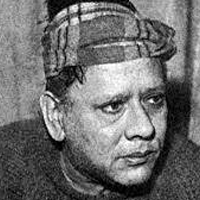Tanveer Naqvi

- Real Name: Syed Khursheed Ali
- Born: 6 Feb, 1919 (Lahore, Punjab, Undivided India)
- Died: 1 November, 1972 (Lahore, Punjab, Pakistan)
- Primary Cinema: Hindi
- Spouse: Eidan Bai
Tanveer Naqvi is renowned for penning the lyrics of musical hits such as Anmol Ghadi (1946) and Jugnu (1947), starring Dilip Kumar and Noorjehan. Hailing from a family of poets who originally came from Iran, his upbringing was immersed in poetry, literature and arts. Influenced by the poetry of dissent against the British Empire, he was known to be a progressive, keeping the company of like-minded thinkers such as Faiz Ahmed Faiz. Prior to entering films, he also wrote ghazals. Moving to Pakistan post Partition, he penned lyrics for films there such as Teri Yaad (1948), Salma (1960), Hamraaz (1967) and Att Khuda Da Vair (1970). He remained a popular songwriter of Urdu and Punjabi films for more than 15 years.
Born on 6 February, 1919 in Lahore, Punjab, music enthusiast Zulqarnain Shahid draws Naqvi’s lineage from a family of poets originating in Iran. His father was a jhagirdar and his elder brother, an ADC to a nawab. Educated in Urdu and Persian, from the age of 14, he started writing poetry and also took part in in various gatherings of poets. Absorbing early poetic and artistic influences at a young age, Naqvi was particularly inspired by the verse of protest and defiance. He published a book of his poetry titled Suhane Sapne, which was read by filmmaker A R Kardar. An impressed Kardar called Tanveer to Bombay to write for his film Swami (1941), directed by Abdul Rashid Kardar. Influenced by progressive thinkers, Naqvi desired to articulate their ideology through the medium of cinema to the masses.
In his next film, Nai Duniya (1942), Suraiya sang a song penned by Naqvi as her first song. Naqvi went on to write the lyrics for close to 200 films. His lyrics for Mehboob Khan’s Anmol Ghadi, with music by Naushad, and Jugnu (1947) are particularly memorable. Among his much-appreciated songs are Awaaz de kahan hai, Jawan hai mohobbat and Mere bachpan ke saathi. The lyrics of the Noorjehan-Surendra duet Awaaz de… have been singled out for attention by Jayson Beaster-Jones in his book Bollywood Sounds, where he notes the importance of Naqvi’s poetic imagery in the lyrics which denote the procession of the moon and the stars at the end of a long night of separation. Naqvi also penned the lyrics for Naata (1955), a film produced by Madhubala under her banner, Madhubala Pictures Pvt. Ltd. Apparently, Madhubala was keen to have Lata Mangeshkar sing for the film but when the latter declined, the actress then contacted Naqvi’s wife, Eidan, who managed to convince Mangeshkar to sing for the film written and directed by D N Madhok.
To Naqvi also goes the credit for introducing Mohammad Rafi to the film industry. Rafi had debuted as a playback singer in Lahore in 1941 with the song, Soniye nee heeriye nee for the Punjabi film Gul Baloch (1944). He moved to Bombay the same year, renting a room in Bhendi Bazaar. It was Naqvi who introduced Rafi to influential film producers like Mehboob Khan and Rashid Kardar, with Shyam Sunder eventually offering Rafi the opportunity to sing alongside GM Durrani in Gaon Ki Gori (1945), rendering his first Hindi film song, Aji dil ho kaabu mein to dildar ki aisi taisi.
Post Partition, Naqvi moved to Pakistan where he wrote the lyrics for several films made there. These include the first Pakistani feature film Teri Yaad (1948) as well as the first film in which Noorjehan was a playback singer, Salma (1960). His other noteworthy films in the Pakistan film industry include Jhoomar (1959), Neend (1959), Koel (1959), Ghunghat (1962), Hamraaz (1967) and Att Khuda Da Vair (1970). A much in-demand songwriter, he remained a leading lyricist of Urdu and Punjabi films for over 15 years. In particular, his patriotic song rendered by Noor Jahan during the 1965 war Rang laayega shaheedon ka lahoo became very popular.
Among his memorable songs, is Kahan tak suno ge kahan tak sunaoon, penned by Naqvi and rendered by Noor Jehan for Anwar Kamal Pasha’s Anarkali (1958) made in Pakistan. This song remains etched in the memory of music lovers. Incidentally, the song was apparently first written by Naqvi for the legendary romantic saga, Mughal-E-Azam (1960). Filmmaker K Asif desired Naqvi to pen the songs for his magnum opus, for which he even called him over from Pakistan. However, after writing a few songs for the film, the association between Naqvi and Asif soured. As a result Naqvi returned to Lahore, and the song he had penned was offered to Anarkali.
Naqvi was married to Eidan Bai, the sister of renowned singer and actress Noor Jahan. A collection of his poetry was published under the title Sunahre Sapne. Tanveer Naqvi passed away on 1 November, 1972 in Lahore.
References
https://www.rekhta.org/poets/tanveer-naqvi/profile
https://www.cinestaan.com/articles/2017/nov/1/8960
Image courtesy: rekhta.org









.jpg)


